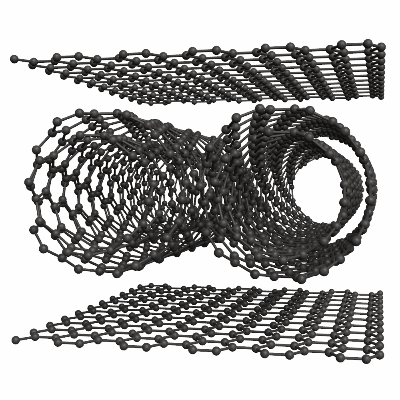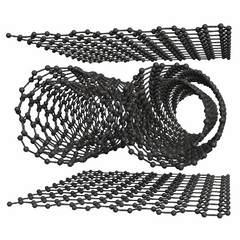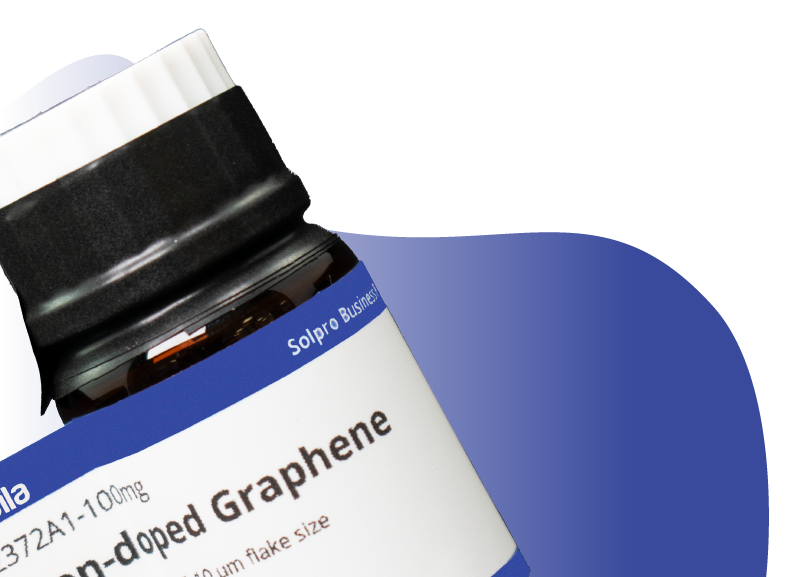Graphene Carbon Nanotubes Composite
CAS Number 308068-56-6
2D Materials, Carbon Nanotubes (CNTs), Graphene Materials, Low Dimensional Materials, MaterialsHigh Electrical Conductivity and Large Surface Area
Wide range of applications from biosensors and drug delivery to hydrogen storage and supercapacitors
Product Information | MSDS | Related Products
Graphene carbon nanotubes composite (CAS number 308068-56-6), also referred to as graphene carbon nanotubes hybrid, composes of covalently bonded graphene (2D) nanopowders and multiwalled carbon nanotubes (1D).
Carbon nanotubes (CNTs) have improved electrical conductivity and a large surface area, while graphene or chemically modified graphene nanosheets possesses high charge density and outstanding mechanical properties. Graphene is also known to form irreversible agglomerates or to restack to form graphite through the van der Waals interactions during the drying process. CNTs can be used as spacers for graphene nanosheets to prevent agglomeration happening between the layers.
Graphene carbon nanotubes show effective improvements in electrical and mechanical properties with enhanced electrical conductivity, additional flexibility, high mechanical stability, and readily accessible surface area. The combination of these two materials creates a versatile 3D graphene-CNT hybrid network with synergic properties.
High Electrical Conductivity
>98 S/cm (CNT), >1000 S/cm (graphene)
Worldwide Shipping
Quick and reliable shipping
Low Price
Low price graphene carbon nanotubes
Large Surface Area
High readily accessible surface area
General Information
| CAS Number | 308068-56-6 |
|---|---|
| Chemical Formula | C |
| Composite |
32 wt% graphene nanopowder, 68 wt% MWCNT |
| Purity |
> 99% (graphene), > 97% (CNT) |
| Form | Black powder |
| Synonyms | Graphene/carbon nanotube composite, Graphene/CNT hybrid |
| Classification or Family | Graphene, Carbon Naotubes, 2D Materials, Carbon Nanomaterials, Hybrid Materials, Composite Materials |
Chemical Structure

Product Detail
| Conductivity (S/cm) |
>98 (CNT), > 1000 (graphene) |
|---|---|
| Specific Surface Area (m2/g ) |
>65 (CNT), > 500 (graphene) |
| Graphene Dimensions |
5 nm (thickness) 1 – 12 µm (flake size) |
| CNT Dimensions |
50 nm (diameter) 15 – 25 µm (length) |
MSDS Documentation
Graphene Carbon Nanotubes Composite MSDS Sheet
More on Graphene Carbon Nanotubes Composite
With improved electrical conductivity and high readily accessible surface area, graphene carbon nanotubes composite may find applications in:
- Sensors
- Electrodes for batteries and supercapacitors
- Hydrogen storage
- Water purification
- Aerospace and automobiles
References
- Recent progress in the synthesis of graphene/CNT composites and the energy-related applications, X. Wu et al., J Mater Sci Technol., 55, 16-34 (2020); DOI: 10.1016/j.jmst.2019.05.063.
- Carbon nanotube/graphene composite for enhanced capacitive deionization performance, Y. Wimalasiri et al., Carbon, 59, 464-471 (2013); DOI: 10.1016/j.carbon.2013.03.040.
- Carbon nanotube/graphene nanocomposite as efficient counter electrodes in dye-sensitized solar cells, J. Velten et al., Nanotechnology 23, 085201 (2012); DOI: 10.1088/0957-4484/23/8/085201.
Related Products
We stock a wide range of 2D materials available to purchase online. Please contact us if you cannot find what you are looking for.



